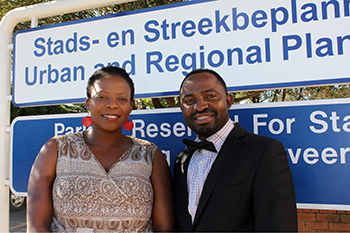Latest News Archive
Please select Category, Year, and then Month to display items
09 November 2018
|
Story Charlene Stanley
|
Photo Charlene Stanley
 Dr Tseliso Ntili, HOD of the Free State Department of Water and Sanitation, warns that pollution caused by mismanagement of municipal water-treatment works puts severe pressure on the province’s water security.
Dr Tseliso Ntili, HOD of the Free State Department of Water and Sanitation, warns that pollution caused by mismanagement of municipal water-treatment works puts severe pressure on the province’s water security.
“Despite our water challenges, Bloemfontein will never become a second Cape Town.” This firm assurance was given by Dr Tseliso Ntili, HOD of the Free State Department of Water and Sanitation, during his presentation at the recent regional seminar of the Faculty of Law’s Environmental Law Association.
The theme of the seminar was Water Quality and Water Security in Bloemfontein and was attended by staff and students from the Faculty of Law and the Faculty of Natural and Agricultural Sciences, as well as relevant role players from private, business, and government sectors.
Not enough water for city’s needs
Water restrictions in some form do seem to remain part of our future landscape though, as Dr Ntsili explained that the city’s current water yield of 218 megalitres per day still fell short of the demand of 259 megalitres per day.
Pollution and mismanagement at municipal level
He pointed out that a big cause for concern was that 75% of the Free State’s waste-water treatment works were dysfunctional. Housekeeping and security at these plants are often severely neglected. Yet, it is difficult for the Department of Water and Sanitation to act against offending municipalities.
“In intra-governmental disputes, the courts must be satisfied that organs of state have taken all reasonable steps to settle contentions – which can be a time-consuming process,” he explained.
Dr Ntsili said that the Caledon River System’s dwindling water levels due to low rainfall and siltation was also a concern, but that plans were underway to supplement the water supply to Bloemfontein via the Gariep Dam by 2026.
However, he warned that poor water management could drastically affect these long-term plans.
“If we can’t manage pollution, the cost will be high. Water security will be challenged, and we will have water shortages – not because of drought, but because of negligence.”
Young academic receives BRICS research funding
2017-04-13

Dr Thulisile Mphambukeli and Dr Victor Okorie
from the Department of Urban and Regional Planning
at the University of the Free State.
Photo: Rulanzen Martin
“It means a lot to me, as I am a young academic embarking on my postdoctoral research project. To be able to lead a team of researchers from various research institutions in South Africa is humbling.” This is what Dr Thulisile Mphambukeli had to say on being awarded a research grant by the South African BRICS Think Tank.
The think tank, in collaboration with the National Institute for the Humanities and Social Sciences (NIHSS), awarded the lecturer in Urban and Regional Planning at the University of the Free State (UFS) R150 000. She will spearhead a research project between BRICS (Brazil, Russia, India, China, and South Africa) universities. “They have awarded me a three-month grant to facilitate a process of combining various research projects under the BRICS Academic Cluster,” Dr Mphambukeli said.
Platform provides collaboration
“The academic cluster provides a platform for researchers and academics to engage in ongoing collaboration,” she said. The grant will enable her and her research partner, Dr Victor Okorie, postdoctoral fellow in the Department of Urban and Regional Planning at the UFS, to put together a research proposal to be submitted at the end of May 2017. If successful, her team will conduct a research study across BRICS countries over a period of three years. It will be done in collaboration with various South African universities, who will form a team to collaborate with researchers from BRICS universities.
Great accomplishment for UFS
“The funds we have received are quite a great accomplishment for the UFS and our department,” Dr Okorie said. The UFS has become a force to be reckoned with when it comes to emerging issues in BRICS politics and policies. “Our project looks at the provision of ecosystems, agriculture, and security and the UFS was chosen as the host institution.”